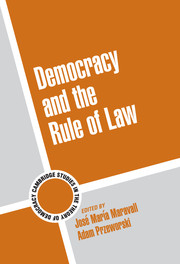Book contents
- Frontmatter
- Contents
- List of Contributors
- Acknowledgments
- Introduction
- Part I
- Part II
- Part III
- 9 Courts as an Instrument of Horizontal Accountability: The Case of Latin Europe
- 10 Rule of Democracy and Rule of Law
- 11 The Rule of Law as a Political Weapon
- 12 The Rule of Law and the Problem of Legal Reform in Michel de Montaigne's Essais
- Author Index
- Subject Index
11 - The Rule of Law as a Political Weapon
Published online by Cambridge University Press: 09 November 2009
- Frontmatter
- Contents
- List of Contributors
- Acknowledgments
- Introduction
- Part I
- Part II
- Part III
- 9 Courts as an Instrument of Horizontal Accountability: The Case of Latin Europe
- 10 Rule of Democracy and Rule of Law
- 11 The Rule of Law as a Political Weapon
- 12 The Rule of Law and the Problem of Legal Reform in Michel de Montaigne's Essais
- Author Index
- Subject Index
Summary
Let us assume that politicians want to be in office and to maximize their autonomy in decision making. On the other side, citizens want to avoid abuses by politicians. Citizens have two instruments to protect them: first, to throw the rulers out of office at election time; second, to enforce, through institutions, legal limits to the political discretion of incumbents between elections. The first protection is provided by democracy; the second, by the rule of law. Prima facie they complement each other. Citizens are not just interested in electing politicians who, once in office, are controlled only by the prospect of future elections; they are not interested either in unelected, nonrepresentative rulers, even if bounded by laws passed by an undemocratic assembly.
I use here a minimalist definition of the rule of law. It consists of the enforcement of laws that have been publicly promulgated and passed in a preestablished manner; are prospective (nulla poena sine lege), general (like cases are treated alike), stable, clear, and hierarchically ordered (the more particular norms conform to the more general ones); and are applied to particular cases by courts independent from the political rulers and open to all, whose decisions respond to procedural requirements, and that establish guilt through the ordinary trial process. This definition makes no reference to fundamental rights, democracy, equality, or justice: it corresponds to what Dworkin (1985: 9–32) has termed the “rulebook” conception of the rule of law.
- Type
- Chapter
- Information
- Democracy and the Rule of Law , pp. 261 - 301Publisher: Cambridge University PressPrint publication year: 2003
- 22
- Cited by

